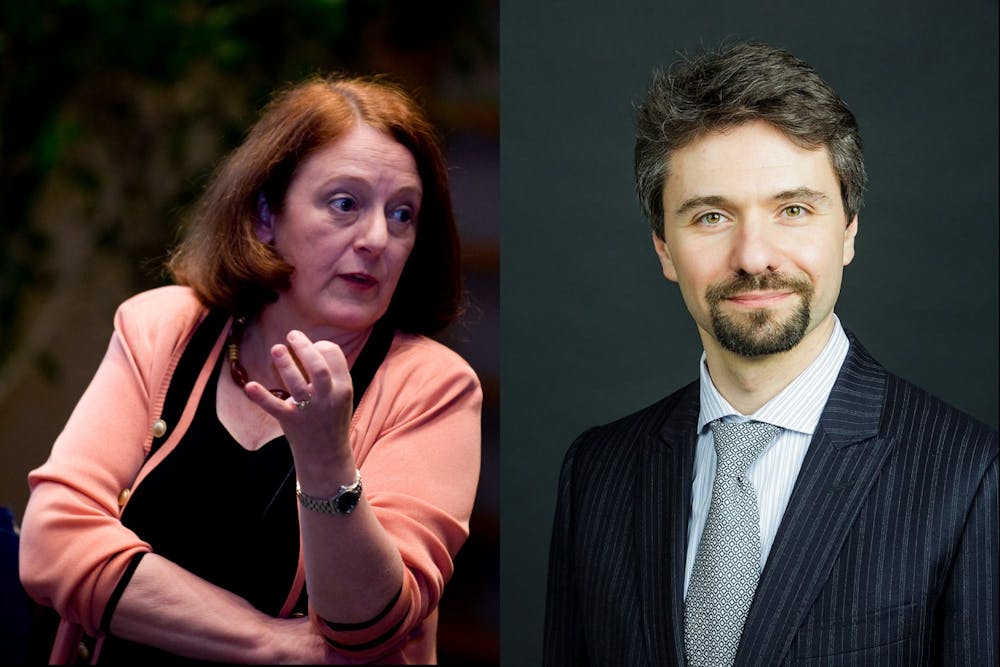
Wharton will offer a new course in fall 2020 to teach students economic literacy and how to avoid making financial mistakes.
The course, Consumer Financial Decision Making, will be open to students from all years and schools and will explain how to make financial decisions relating to mortgages and insurance. Although some classes cover similar topics, professors Olivia Mitchell and Nick Roussanov said the courses currently offered explain how markets work, rather than how the markets impact individuals.
Mitchell is a professor in the Business Economics and Public Policy Department, and Roussanov is a professor in the Finance Department. The course will be cross-listed as BEPP 202 and FNCE 202.
Mitchell said the common consequences of financial illiteracy are that people sign up for credit cards that they cannot pay back, take out student loans that they cannot afford, and borrow from other sources without understanding interest rates.
Roussanov said unlike other behavioral finance classes, the new course will focus on how to avoid individual financial mistakes, instead of the psychology behind their decisions. Mitchell added that no other course currently focuses on financial literacy.
The course will be structured around the stages of a person's life and the financial decisions they will need to make, Mitchell said. The earlier modules of the course are meant to help students make the decisions they will be confronting soon, such as pursuing higher education, starting a business, and buying a home. The later modules of the course will focus on topics such as health care and retirement.

Business Economics and Public Policy Professor Olivia Mitchell (left) and Finance Professor Nick Roussanov (right)
“We know from a number of different surveys in our research that financial illiteracy is endemic in the population, not just in the U.S. but around the world. And it’s very problematic for young people,” said Mitchell. “Immediately [into] college, I think students need to start to understand their financial world and the decisions they’re making.”
Mitchell cited one of her studies, in which young adults aged 23 to 28 were asked three basic questions about interest rates, inflation, and risk diversification. The results of the survey showed that only 27% of people surveyed could answer all three questions correctly.
Roussanov said the course is important because people are more responsible for their financial future now than ever.
“It used to be that you got a job and it was basically — if not for life — for a long time. You got a defined benefit plan and you didn’t have to worry about saving for retirement,” he said. “It’s not like that anymore. You have to choose your own contributions to the 401k. You have to figure out what kind of insurance products you do and do not need to buy.”
The professors plan on making the course accessible by making it open to undergraduates in all schools and years.
“We’re not just interested in students from economics or Wharton. You want everybody to leave college with financial savvy, and that’s kind of what we’re trying to do,” said Mitchell.
Both Mitchell and Roussanov said that becoming financially literate will help Penn students understand current financial issues.
“There’s a lot of discussion in the public sphere about consumer financial protection and what kind of regulation is needed to help consumers,” Roussanov said. “We think Penn students should be well-informed to participate given that this is going to be a hot button issue in the next decade or so.”
Mitchell cited the 2008 financial crisis and how it led to discussions about prohibiting certain financial products. She said educating people could allow them to decide for themselves if certain financial products are right for them.
“It's better to educate people so they can ask the right questions,” she said. “I think we have a real opportunity here at Penn to work with some of the smartest students in the world and help set their feet on a road where they’re better informed to make those decisions.”
The Daily Pennsylvanian is an independent, student-run newspaper. Please consider making a donation to support the coverage that shapes the University. Your generosity ensures a future of strong journalism at Penn.
Donate







